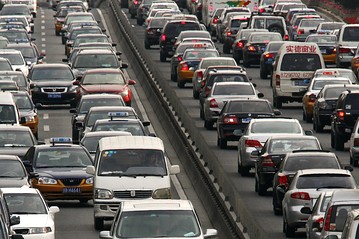Beijing
Taxi Drivers
Peter Wu
12 March 2011
I’ve gone into a deep, deep depression after I read this article. Although it refers to the taxi drivers,
I fall into the category of salary-man who sits on my bums all day every day. So by implication, what causes the
‘malfunction’ of the taxi drivers also affects me.
As if the ‘money shivering’ syndrome who has been affecting me for
years is not enough…I now have this to deal with…sigh!
This world is not very fair, is it?
附文
Beijing Taxi Drivers Suffer Affliction in Silence
As if the traffic, smog, long hours and low pay weren’t disincentive enough, a new study has found one more reason men in Beijing might want to avoid choosing a career as a taxi driver.

David Gray/Reuters
Traffic isn’t the only hazard Beijing’s cab drivers face.
A China Family Planning Association survey of 350 Beijing cabbies revealed that nearly 57% admitted to having problems with erectile dysfunction, according to report by the state-run Xinhua news agency. The results were discovered in a five-month project the association conducted to improve Beijing taxi drivers’ sexual and reproductive health.
The project, in partnership with the International Planned Parenthood Federation, also found that taxi drivers are 10% more likely to suffer from prostate gland inflammation than the general population, Xinhua said.
The report did not explain why taxi drivers were targeted for the study but said health authorities are paying more attention to male reproductive health following decades of focus on women and population control.
The likeliest cause for the taxi driver’s reproductive problem? Prolonged sitting. The city’s 90,000 drivers clock in a daily average of 10 hours behind the wheel, Xinhua said, citing the China Family Planning Association.
Erectile dysfunction is prevalent in 26% of Chinese men, according to a separate Xinhua-cited study, conducted by the Chinese Medical Association in 11 Chinese cities last year.
Among men older than 40, the occurrence rises to 40%. Risk factors include cardiovascular disease, diabetes, hypertension, and habitual smoking, the report said.
China has nearly 300 million smokers, most of whom are males. Nearly 60% of China’s adult male population smokes.
In the U.S., an estimated 18 million men over the age of 20, roughly 17%, have trouble maintaining an erection, according to a 2007 study by the Johns Hopkins Bloomberg School of Public Health. In the U.S., the problem is linked primarily to age, diabetes, cardiovascular disease, and lack of physical activity, according to Johns Hopkins.
Sales of Pfizer’s erectile dysfunction drug Viagra have surged in China since 2004, when it was first allowed to be sold at pharmaceutical retail. Pfizer declined to disclose China sales information for Viagra, which is known as “Wei Ge” and means “great elder brother” when translated into Chinese. Prior to the drug’s entry into China, many Chinese men turned to traditional medicine, namely tiger bone, to cure impotence. The Chinese government banned the sale of tiger bone in traditional Chinese medical clinics in 1993, when it joined a ban of international trade in tiger products.
More than 80% of men afflicted with erectile dysfunction in China fail to seek medical help due to poor public awareness, Xinhua said. The China Family Planning Association has attempted to spread more information about reproductive health by leaving pamphlets in taxis for passengers and drivers.
The association attempted to produce a radio show on sexual health with Beijing’s Communication Radio, a popular radio station among cab drivers, but the partnership was turned down, Xinhua said. Beijing Communication radio is not allowed to broadcast “things related to body parts below the waist,” the report said, citing Qi Yuling, a program officer at China’s Family Planning Association.